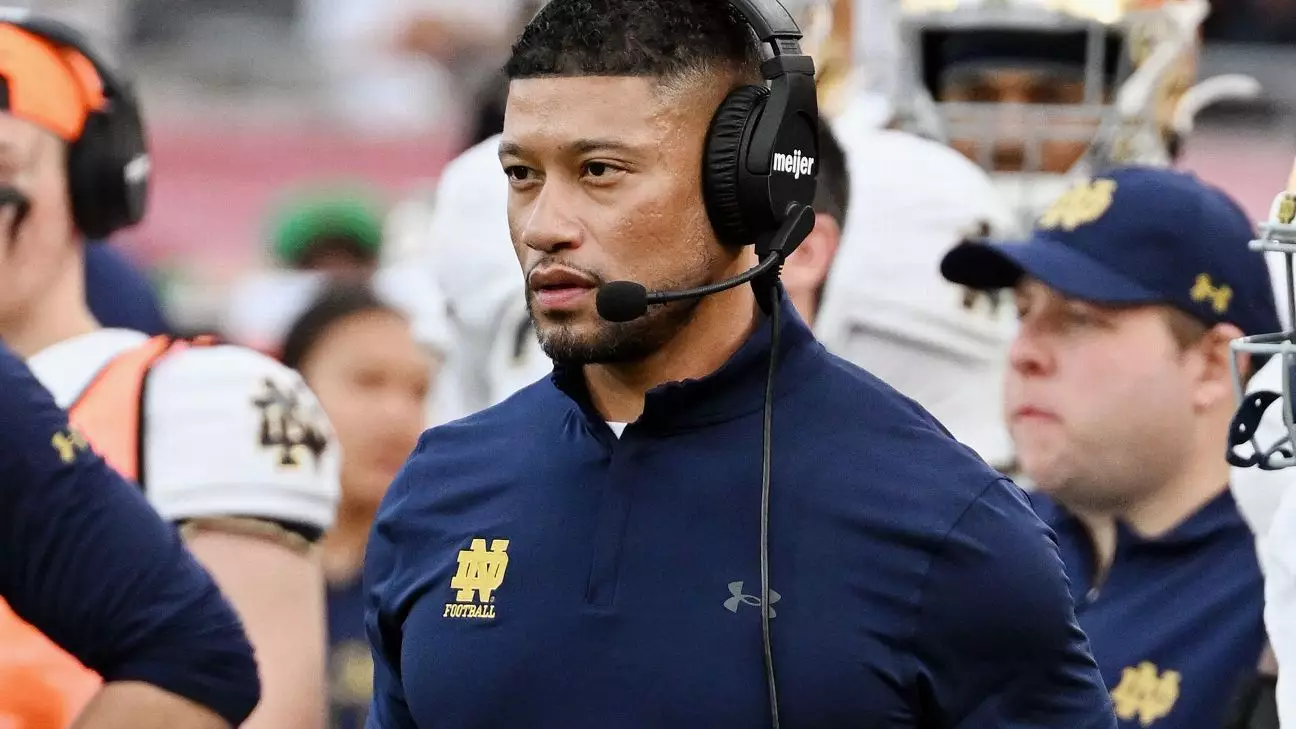As the College Football Playoff Semifinal approaches at the Capital One Orange Bowl, a poignant milestone looms for both Notre Dame’s Marcus Freeman and Penn State’s James Franklin. When they take the field, they will not only be competing for a spot in the national championship game but also standing at the precipice of history. The winner is set to become the first Black head coach to lead a team to this prestigious event, a feat that carries profound implications for representation and achievement in collegiate sports.
During pre-game discussions, both coaches reflected on the weight of this possibility. Franklin drew parallels to Super Bowl XLI, in which Tony Dungy and Lovie Smith became the first Black head coaches to compete against each other in the NFL’s championship game. He pointed out that at that time, there were only six Black head coaches in college football—a stark contrast to today, where that number has grown to 16 amidst 134 FBS programs. While some may see this as slow progress, Franklin is keenly aware of the significance such changes can have for aspiring coaches of color. “It may not seem like a large increase,” he remarked, “but every step forward represents an opportunity for change in the profession.”
Freeman’s personal narrative also adds a critical dimension to the conversation about representation in sports. With a multicultural background, he emphasizes that his journey is as much a reflection of those who came before him as it is about his accomplishments. “It’s important to recognize the symbolic weight of my position,” he said, acknowledging the influence he can have on young coaches and players who share similar backgrounds. His commitment stretches beyond personal ambition; Freeman articulated a strong desire to pave the way for future generations, asserting that he aims to embody excellence and serve as a role model.
Both coaches understand that while the spotlight may be on them, the broader implications reach far beyond the game itself. These moments serve as inspirations—not just for individuals within their respective programs but for young athletes and coaches across the nation who dream of taking leadership roles in their careers. The visibility of Black head coaches in high-profile positions can shift narratives and create pathways in a profession where opportunities have historically been limited.
A Legacy Built on Teamwork and Inclusion
Despite being acutely aware of the ground they occupy, both Freeman and Franklin emphasized the team ethos that underpins their journeys. Freeman shared that his focus remains on team success rather than personal accolades, echoing sentiments that challenge the notion of individual glory in sports. “This is not about me,” he stated. “My aim is to uplift the entire program and achieve team glory. Ultimately, we want to showcase the strength that comes from collaboration and hard work.”
Franklin similarly echoed these sentiments in his remarks about the honor of coaching against Freeman. “To represent Penn State and the young men in that locker room means everything to me,” he explained. This focus on collective success illustrates how their individual achievements are interwoven with the identity and aspirations of their teams.
As they stand on the verge of an iconic moment, both coaches are acutely aware of their responsibility as role models. Freeman hinted at the work that lies ahead—beyond the game—indicating a desire to actively contribute to the development of future coaches. As he contemplated his potential impacts, he asserted that making decisions to help others is a critical part of true leadership.
Franklin, too, takes pride in his role, expressing hope that his journey and that of his fellow coaches can lead to broader opportunities for new entrants into the coaching profession. This isn’t just about current accolades; it’s about creating a professional landscape that is more inclusive and equitable.
The impending clash at the Capital One Orange Bowl represents more than just a football game; it symbolizes a historic moment in the fight for representation in athletics. With Freeman and Franklin at the helm, the opportunity exists not just to win a championship but to lay the groundwork for a more inclusive future in college football. Their narratives remind us of the significance of representation and the potential for change, inspiring a new generation of leaders in the sport.


Leave a Reply